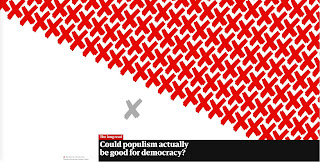Media representation of publics

Lewis, J., Inthorn, S. and Wahl-Jorgensen, K. (2005). Citizens or Consumers? What the Media Tell Us About Citizen Participation . Maidenhead: Open University Press [Ch 8] This week we will examine the role of the public or citizens in political debate in the mediated public sphere. Drawing on this week’s key reading, we will consider whether the public are represented and addressed as active and engaged citizens with opinions on policy choices, or as political consumers making passive choices between leaders and their agendas. Claims about public opinion in the news “While the news makes frequent references to citizens and public opinion, it does so with very little reference to any identifiable source of evidence […] only 3% of references to citizens or publics on television news in the USA or Britain make any reference to polling data. “If polls are the only systematic form of evidence available to journalists about what citizens think ...
